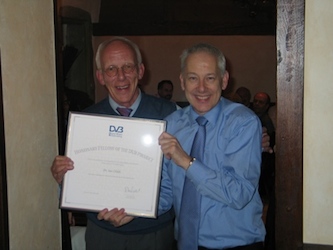Honorary Fellowship
Honorary Fellowship of the DVB Project aims to recognize, on their retirement from active participation in the DVB Project, significant individuals who have made sustained and substantial contributions to DVB over the years. This form of ‘lifetime achievement award’ was created by the DVB Steering Board in 2006. It represents the highest honour that can be bestowed upon a participant in the work of the DVB Project.
Our Honorary Fellows are asked to continue to support the DVB Project and, where appropriate, are consulted for advice at the Chairman’s request. Honorary Fellowships are granted very rarely and are not granted to any person by default. It is a discretionary award made by the DVB Chairman to an individual, not a company.
David Wood
Formerly of the European Broadcasting Union; awarded 19 March 2025
David Wood was working with the EBU in Geneva when DVB was founded in 1993. He was asked to run the Project Office for the new organization, working with Kristine Kabat, Edgar Wilson, and Peter MacAvock, who was subsequently asked to manage the project. David was Secretary to the Technical Module, and central to the development of the first DVB specifications. Over the years that followed, he was never far from DVB, being an important contributor to the development of the specifications for UHD and leading the work on 3DTV, alongside active involvement across a wide range of other work items.
David’s impact on media technology went far beyond his work with the DVB Project. He joined the BBC as a graduate trainee in 1968, remaining with the British broadcaster for five years. He then joined the IBA (Independent Broadcasting Authority) and worked with the team that developed Teletext, a technology that is still running today in some parts of the world.
In 1980, he joined the technology department of the EBU, then based in Brussels. When the department was moved to Geneva in 1989, he also made the move and played a variety of roles over the years, often representing the EBU in other organizations. He led the International Telecommunication Union (ITU) groups that prepared the recommendations for digital television, HDTV, and UHDTV; and he also has a lifelong interest in media accessibility. While he retired officially in 2012, he continued to contribute to the EBU’s work as a consultant for a further 12 years, only winding down in 2024.
David was educated at the University of Southampton, Southampton, U.K., the Popov Institute, Ukraine, and the Harvard Business School, Boston, MA. He has received several awards including the SMPTE Progress Medal, a Distinguished Service Award from the ABU, the Zworykin award from the National Association of Broadcasters in Russia and a Lifetime Achievement honour from the TVB Awards.
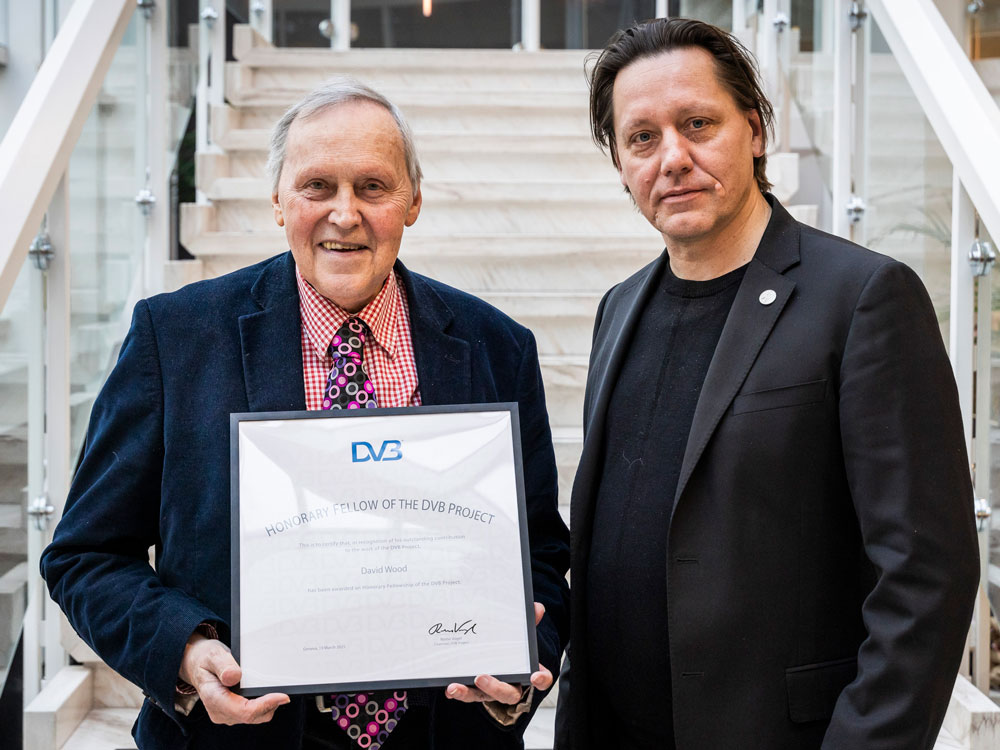
Martyn Lee
Formerly of Sky; awarded 20 March 2024
Martyn Lee was the second chair of the DVB Commercial Module, taking over from Graham Mills in 2018. He held the role until November 2023, when he retired from Sky.
Presenting him with the certificate, DVB chair Peter MacAvock noted that, throughout his tenure, Martyn had had to address some very difficult tasks. Most notably, the CM was the forum to decide on the requirements for what were termed Next Generation Video Codecs. “The CM chair’s patience, deep understanding of the relative positions of the stakeholders, meticulous preparation, and his energy were invaluable in navigating these sometimes troubled waters.”
With David Peilow (ESA) replacing him as CM chair, Martyn has pursued other interests, notably music.
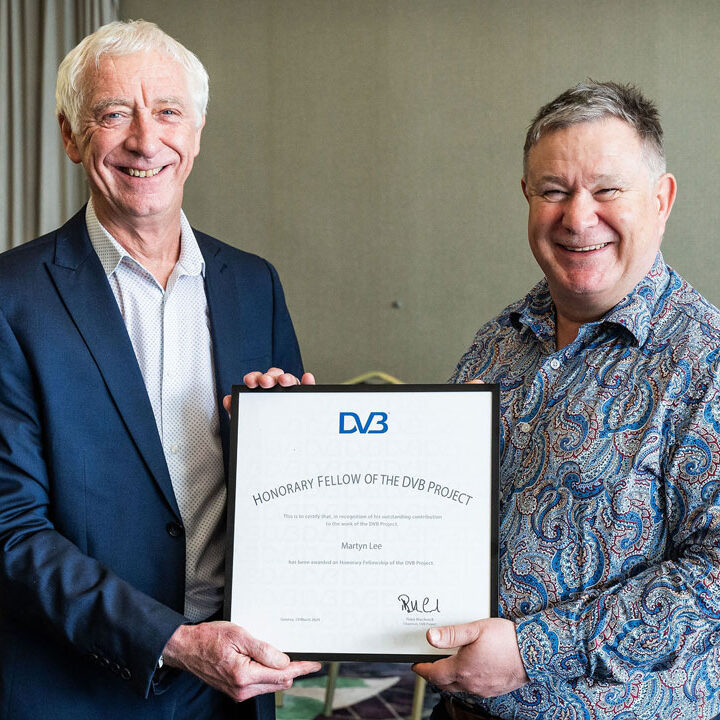
Peter Kahl
Formerly of Deutsche Telekom; awarded 9 November 2023
In 1993, those who had been involved in what was called the European Launching Group set forth on the road to common digital standards for television delivery, with the setting up of the DVB Project.
Industry and broadcasters had been involved in the groundwork, and the initiative required someone who could understand the perspectives, views, and needs of all stakeholders to lead the project. Peter Kahl from Deutsche Telekom in Germany was put forward and universally supported as the historic first chair of the DVB Project. The first specification to roll off the presses was for digital satellite broadcasting, and thus began, under Peter’s guidance, the age of digital television.
Peter Kahl chaired the DVB Project for three years, being replaced in 1996 by Theo Peek. He lives today close to Bonn, Germany.
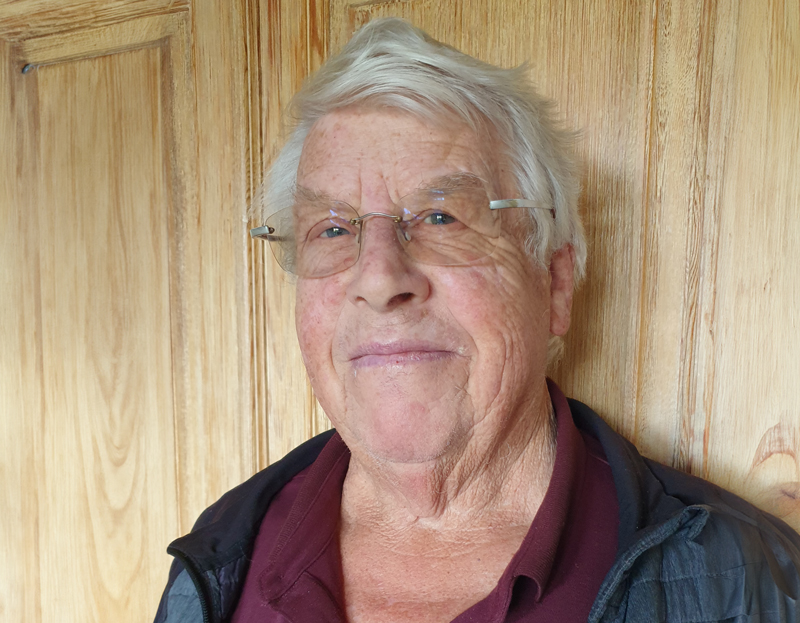
Alberto Morello
Formerly of Rai – Radiotelevisione Italiana; awarded 9 November 2021; presented 18 May 2022
Alberto Morello is best known for his chairmanship of the group that delivered the hugely successful DVB-S2 specification but he was heavily involved across a broad range of the organization’s work, primarily in the transmission domain. He was a key contributor to the equally successful DVB-T2 specification.
Before DVB-S2 or DVB-T2, DVB had state-of-the-art broadcast technologies that were fit for purpose and competitive with anything out there. DVB-S2 and DVB-T2 went a stage further threatening the Shannon limit itself. Alberto Morello was an essential leader in these ground-breaking efforts.
His career at Rai spanned more than 35 years and he led the broadcaster’s renowned research division from 1999 until his retirement in December 2019. In taking a central role in DVB’s work, he was following in the footsteps of his Rai colleague Mario Cominetti, who had shaped the original DVB-S specification.
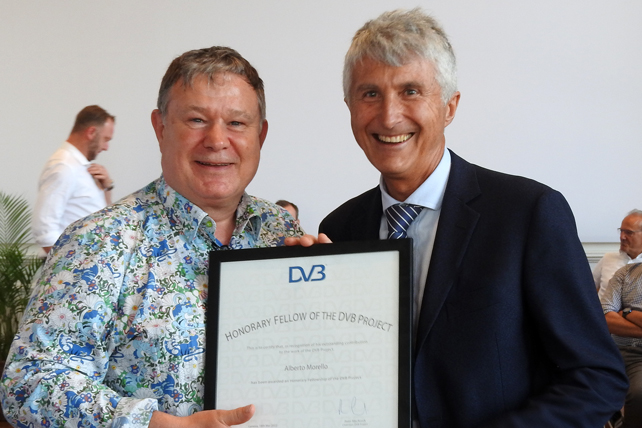
Graham Mills
Formerly of BT Group; awarded 10 November 2020
Graham’s involvement with the DVB Project began at the very first Steering Board meeting in September 1993 and came to an end as the organization marked its 25th anniversary in 2018. As chair of the Commercial Module (and its forerunner the Interactive Services Commercial Module), he played a key leadership role throughout this period.
He largely shaped the process under which DVB defines Commercial Requirements, which is the starting point for all of DVB’s specifications and the cornerstone of our work. He was also notably the pioneer of interactive services in DVB.
As chair of the Commercial Module he guided its members through many complex discussions, with a talent for achieving consensus in seemingly impossible situations.
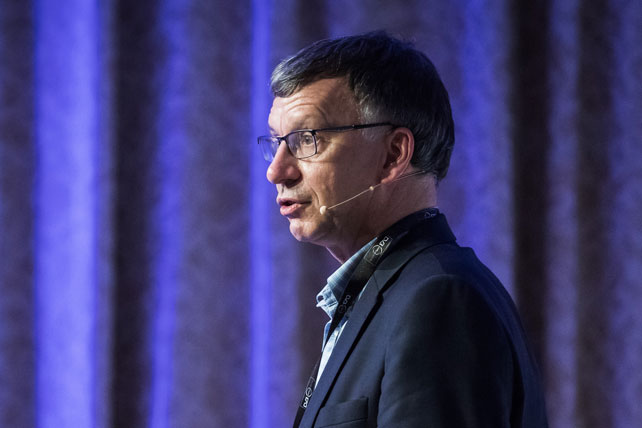
Dr Helmut Stein
Formerly of Nokia and Premiere; awarded 13 November 2019
Helmut Stein was one of the pioneers of digital television. Working for Nokia, he developed the first mass market DVB set-top box, in conjunction with pay-TV magnate Leo Kirch. The latter made industry headlines in 1998 when he ordered 1 million D-Boxes for the German market.
Since the outset of DVB, where Helmut was one of the founders, he has been a visionary in the media space. The Nokia Media Screen, which he developed in 1998, was well ahead of its time, as a battery-powered handheld device with WiFi, mobile telecommunications and a DVB-T receiver.
He chaired the DVB Promotions & Communications Module from the launch of the DVB Project until he stepped down last year. He also helped develop and launch MHP, and has provided valuable advice and resourcing to many DVB activities over the years.
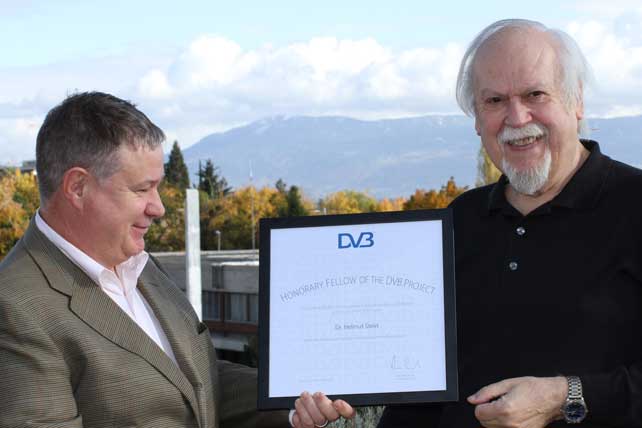
Phil Laven
Formerly of the EBU and BBC; awarded 13 November 2018
Phil Laven was one of DVB’s founding fathers. He was the first signatory of the DVB MoU in 1993 as a representative of the BBC, where he held the most senior technical positions. From 1997 to 2007 he was the director of the EBU’s technical department, where the DVB Project Office is hosted.
His contribution to DVB has been immense. He was Chairman of DVB, representing the EBU, from 2008 until 2016. In addition to guiding the DVB Project, Phil has held senior positions in almost all the specification and standards organizations that have shaped the media industry today, including ETSI, WorldDAB, DAVIC, TV Anytime, and others.
As an individual, Phil has been an advocate of DVB’s way of working and an influential thought leader. His insights into the media industry have proved invaluable to markets and countries launching services and transitioning from analogue to digital TV, SDTV to HDTV and beyond.
Living in the UK, he continues to be very active as a regular contributor to Applied Optics, a publication from The Optical Society.
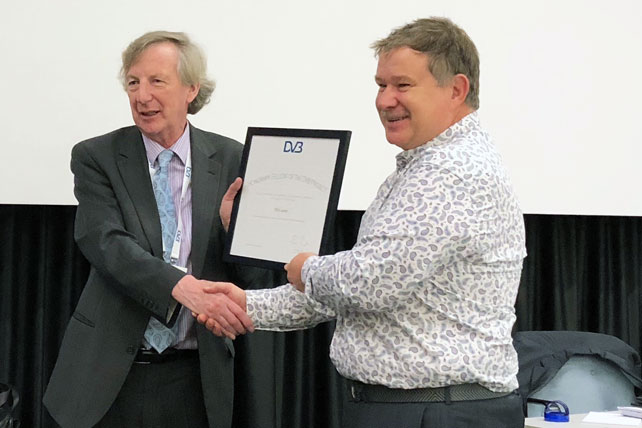
Nick Wells
Formerly of BBC; awarded 15 November 2017
Nick Wells was active in DVB for many years and was instrumental in several of our activities. His crowning achievement was for sure leading the technical group for the development of the DVB-T2 specifications. In his efficient way he managed the group to provide a technically solid specification within the given time frame. The document describes in 188 pages what was the next generation of terrestrial broadcast transmission, offering a wide range of new features and technologies. Since its publication in 2009, DVB-T2 has been implemented in many countries (with Nick’s home country of the UK being the first one, with the 2009 launch of the Freeview HD service). In 2010, for his work on DVB-T2, Nick received the IBC Innovation Award and won the IEEE International Symposium on Consumer Electronics Engineering Excellence Award.
For many years Nick was one of the vice-chairs of DVB’s Technical Module (TM). So he was the ideal candidate for the role of chair when Ulrich Reimers stepped down in 2012. In his three years of chairmanship he oversaw nine TM meetings and read 548 TM documents, of which 48 became ETSI specifications. In 2015 Nick retired from BBC, which also ended his term as TM Chair.

John Bigeni
Former DVB Asia-Pacific Consultant; awarded 15 September 2013
John Bigeni has dedicated his whole professional career to broadcasting. As a young engineer he worked for Australian Broadcasting Control Board (ABCB), Special Broadcasting Service (SBS) as Technical Director & finally the Australian Broadcasting Corporation (ABC), where he became the Head of Engineering. Furthermore, being well known and very much respected in the Asian Pacific Region, the Asian Broadcast Union (ABU) made him the Chairman of the ABU Technical Committee for seven years. But this was just the first part of his career.
Soon after his retirement, at the age of 57, the DVB Project made John the DVB ambassador for the APAC region. In this function John was extremely successful. First he was instrumental in the Australian decision to adopt DVB-T. He then extended his activities to the other countries in the region. Organizing numerous workshops, conferences and trade shows, he became the face of DVB. With his strong understanding of DVB technology, being respected as well as well connected, he could convince the relevant stakeholders of the advantages of DVB standards. Country by country, the region opted for DVB technology. It is his achievement that the Asian region benefits from cost-efficient receivers and a wide range of different services based on DVB standards.
John’s support was not only limited to Asia; on behalf of DVB he also travelled to Latin America and Africa promoting DVB technology. Nobody counted the miles he travelled for DVB but he must have circled the earth several times. Now after nearly 15 years of being Mr DVB, most Asian countries have chosen their terrestrial solution and in most cases it is DVB. At the age of 72, John can look back on the successful promotion of DVB standards. He can be very proud of his achievements and can spend now more time with his family in Sydney. This does not mean that he is off the DVB hook yet. The DVB Project will still come back to him and request his support for special activities. Peter Siebert, DVB Project Office Director: “Working together with my friend John was an excellent experience. John promoted DVB with a lot of emotion and gave it his all.”
John Bigeni passed away in July 2021.
Prof. Dr.-Ing. Ulrich Reimers
Head of the Institute for Communications Technology, TU Braunschweig; awarded 30 October 2012
Prof.Dr.-Ing. Ulrich Reimers was one of the leading forces that led to the creation of the DVB Project and was the Chairman of the DVB Technical Module from September 1993 to June 2012. Prior to that he chaired the WGDTB (Working Group on Digital Television Broadcasting) starting in June 1992, so effectively Ulrich has been at the forefront of digital TV for nearly 20 years. During this time the Technical Module produced thousands of documents and hundreds of DVB specifications. Since 1993 he has been a Professor at Technische Universitaet Braunschweig and Managing Director of the Institut fuer Nachrichtentechnik (Institute for Communications Technology). In addition to these two full-time jobs and enormous accomplishment, Ulrich is actively involved in many international and German digital TV initiatives and government projects. In June 2012 Ulrich retired from the Technical Module Chairmanship, handing the reigns to Dr. Nick Wells from BBC R&D.
“First impressions of people are often misleading. After I first met Ulrich Reimers more than 20 years ago, I described him to a colleague as ‘impressive’. Over the years, I have also learned that he is erudite, precise, punctual, articulate, highly-motivated, calm under pressure, generous and supportive to his colleagues. In other words, my initial judgment proved to be uncannily accurate. On behalf of the entire DVB Project, I can only say ‘Thank you, Ulrich!’ ” (Phil Laven, Chairman, DVB)
We could not possibly list all the praise for Ulrich on this page, so please have a look at DVB Scene magazine issue 40 (September 2012) to read some more kind words.
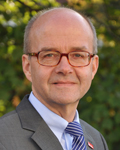
Daniel Sauvet-Goichon
Formerly of TDF; awarded 16 February 2012
Daniel Sauvet-Goichon was a vice chairman of the DVB Technical Module and of its predecessor – the Working Group on Digital Television Broadcasting (WGDTB) – from its very first meeting in June 1992. Since that time he attended nearly all of the 98 meetings of the group. In addition to being vice-chairman of the Technical Module, Mr Sauvet-Goichon was its special rapporteur on frequency planning. This special role was a perfect match to the various positions he held outside of DVB, such as President of the EBU Technical Committee, President of DigiTAG, and President of RRC-06, the Regional Radiocommunication Conference 2006.
“With Daniel´s retirement the Technical Module lost one of its leaders. Daniel was an excellent adviser and friend who was very instrumental in keeping DVB on track throughout a period of nearly 20 years”, commented Dr Ulrich Reimers, Chairman, DVB Technical Module.
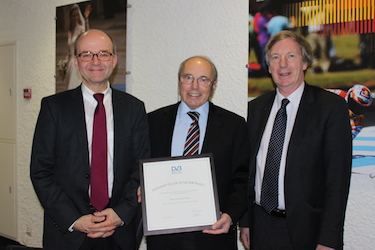
Drs. Theo Peek
Formerly of Philips; awarded 15 October 2008
Theo Peek became the second Chairman of the DVB Project in 1996, taking over from Peter Kahl. Theo led the programme for 12 years to Summer 2008 and under his guidance the DVB Project became the undisputed global leader in providing digital TV specifications. His strong belief in consensus has served DVB well. It has not always been easy to achieve consensus but, thanks to Theo’s patience and determination, agreement has been reached on some very difficult issues. He was highly respected for his impartial approach, always working in the best interests of DVB as a whole.
Theo’s appointment as Honorary Fellow of the DVB Project recognizes his substantial and sustained achievements throughout the period that he led DVB. Some of the highlights include the mobile TV specification for handheld devices (DVB-H), the second generation of the core DVB transmission specifications for satellite and terrestrial broadcasting (DVB-S2, DVB-T2) and the open interface for receiver applications (MHP and GEM) which have been adopted in diverse markets and TV-related products including the Blu-ray Disc specification. Theo has made a lasting impact on DVB and the markets where DVB specifications are used. This award is richly deserved.
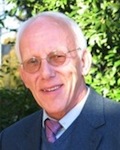
Dr. Ian Childs
Formerly of BBC; awarded 2 November 2006
Dr. Ian Childs attended the very first meeting of the Working Group on Digital Television Broadcasting (WGDTB) which took place in Hamburg in June 1992. He represented the BBC in this meeting and was immediately nominated one of the two vice-chairmen of the group. Since that very first event he attended most of the 75 meetings of the WGDTB which later became the DVB Technical Module. In the early days of the work it had to be decided whether or not hierarchical source coding would be used in order to facilitate the transmission of SDTV and HDTV video in one stream. Dr. Childs volunteered to evaluate the consequences of this decision. He found out that the overhead resulting from hierarchical source coding would be so significant that the simulcasting of SDTV and HDTV videos would be preferable. The ‘Childs Factor’ thus became one of the fundaments of the work in DVB.
In addition to being vice-chairman of the Technical Module Dr. Childs was its special rapporteur on audio. “With Ian’s retirement the Technical Module lost one of its key people and I lost an important advisor and a very good friend”, commented Dr Ulrich Reimers, Chairman, DVB Technical Module.
